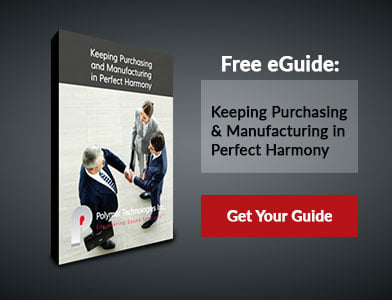When engineers are developing products that require a polymer solution—albeit rubber, insulation, or other material—deciding exactly which materials to use and finding a supplier is an integral part of the product development process. Performance of those materials is not the only concern, either: chances are you’re working within budget and time constraints and need to have expectations clearly defined. In addition to providing materials or a manufactured component, a good supplier is also your partner. Here are some questions you might have during the product development stage that an experienced supplier can address.
 1. What is your lead time?
1. What is your lead time?
In order to plan your project and its benchmarks, you need to know your supplier’s lead time: how long will it be from the time you place your order to the time you receive your shipment. If you’re ready to assemble your product but are missing a crucial component, this will seriously hinder the time it takes before your product can go to market. Ask how quickly your supplier can turn around your orders.
2. How do you handle emergency orders, and how fast is expedited?
You have deadlines to hit, and dealing with a long lead time isn’t always acceptable. This is an instance where it’s necessary to find a supplier who is willing to go above and beyond in order to deliver your materials as quickly as possible. Ask if your supplier is able to handle emergency orders and exactly what it means when an order is expedited.
3. How long will your material last?
Manufacturers occasionally have to sacrifice quality of their materials in order to get the lowest cost possible, but this can backfire. If you offer any sort of warranty on your products but parts wear out easily from overuse, you’ll find yourself bearing the cost of replacement—or you’ll simply find that customers are unsatisfied with your product. Your supplier should be able to give you a clear answer as to how long the material will last when your product is used as expected.
4. What types of testing do you do to determine the right solution for my problem?
Sometimes, engineering teams seek out a polymer materials expert because they need consultation on the right material for their projects. Other times, they’re trying to upgrade an existing product because their current solutions are underperforming.
Whatever the case, if you’re not sure what material you need or if your chosen material is up to par, your supplier should be willing to perform testing with various materials before deciding on the one that will accomplish your goals. Maybe you’re concerned about heat resistance, water-repellant properties, noise damping, vibration control, aesthetics costs, or all of those factors. A materials expert can help determine which solution is right depending on your needs, and they should be specific with you about what kinds of tests the materials will undergo to determine this.
5. What is the most cost-effective way to place my orders?
The quality and effectiveness of your materials is important, but naturally, you’re looking for ways to save costs wherever possible. Your supplier should be able to let you know whether it’s more cost-effective to order in bulk or to place recurring orders over a certain time period.
6. What can you do to lower my costs without changing the material for my product?
Testing of various materials can help you decide the best, most cost-effective material for your needs, but once you’ve decided on the material, there may be additional ways to lower costs (aside from how you place orders). For instance, the more parts your product has, the more time-consuming and costly assembly is, which may be why you’re looking to better utilize your product’s materials.
Sometimes, a custom molded foam solution can reduce the parts in your product, making it more uniform and simpler to assemble. Besides, standardized components are not best suited for all products. Perhaps instead of getting three different pieces, there could be one piece of custom molded foam that works for all applications, making production more efficient. If your supplier can pre-assemble certain parts for you, this is another way to optimize production and lower costs. You should be able discuss all of these concerns with your supplier.
7. Will your manufacturing processes cause a loss in material quality?
You may be concerned that although you are aware that you are receiving a product that has been tested and is of high quality, your supplier’s manufacturing process may impact that quality. This could be due to the machinery and tools used and the overall quality of your supplier’s process. You may want to ask what the supplier’s margin of error is and how much excess material they plan to go through to compensate for production errors. It’s important to know whether this excess material will negatively impact the costs of production.
Work with a supplier who can address your most crucial questions
Ultimately, your project will be impacted by the ability of your supplier to support you. A good supplier can work with you throughout product development to determine the best materials to use. These aren’t, of course, the only questions that may come to mind when you’re vetting suppliers. If you’ve chosen the right supplier, they should be helpful and eager to answer your most important questions.




 1. What is your lead time?
1. What is your lead time?

